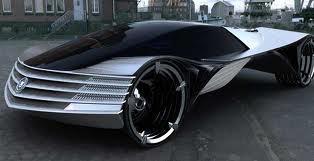Thorium 7 - vehicle engines
There has been research in developing small thorium engines for consumer products like cars. Interest in such engines has increase recently with the concern about the decline in the oil supply and global warming. It is estimated that one gram of thorium contains the equivalent energy found in 7,500 gallons of gasoline.
Cadillac debuted the Thorium Fueled Concept car designed by Loren Kulesus at the 2009 Chicago Auto Show. The design called for redundancy in all the major systems so that if a part failed, a backup part would take over. The car was supposed to last 100 years without need for replacement of parts or refueling. The design concept called for a small thorium powered nuclear reactor but the vehicle did not contain a real thorium engine. The reactor was to be contained in a study housing to prevent accidental or intentional tampering and had multiple systems to kill the reaction in case of any problems.
A MaxFelaser is an example of a next generation table top accelerator that can support electrical fields much stronger than the old accelerators required. The thorium is inserted into a cavity laser. The alpha and beta particles released by the thorium triggers the lasing process. Power generation has been explored by the heating of a plasma and the utilization of magneto-hydrodynamics. Such generators have the potential to be small and powerful.
It was announced last year that Laser Power Systems in Massachusetts is working on a prototype of a thorium powered “MaxFelaser” generator that could be used to generate enough energy to power a car which would produce no emissions. They says that the thorium will be heated to fire the MaxFelaser beam which will turn water into pressurized steam. The steam will turn a turbine that produces electricity. The steam will be condensed back into water and recycled in a closed system. A 250 kilowatt thorium power system will weigh around 500 pounds and be small enough to drop into the engine well of a regular sized car. The car is would be powered by feeding the generated electricity to motors in the hubs of the wheels.
If such a power generation system can be developed it could be used for a myriad of other purposes such as powering buildings, ships, airplanes, trains, factories, etc. The problem with the Laser Power Systems claims is that there is very little information available about how their system actually works. Their website contains a lot of positive descriptions of the possibilities but very little technical detail. What I have read there does not make a lot of sense. I will feel much better about the reality of a thorium MaxFelaser generator when LPS actual puts a commercial unit on the market. Until then, I am afraid that I remain skeptical about the claims being made by Laser Power Systems.
Cadillac Thorium Fueled Concept car from autoblog.com:
